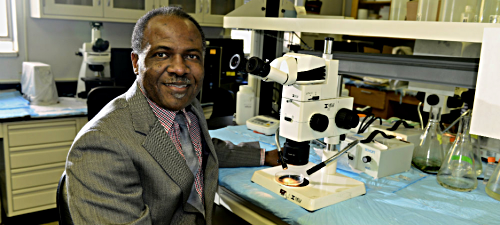The Faculty Award is the highest honor the Board bestows to recognize faculty achievement

Paulinus Chigbu, Ph.D., Director of the NOAA Living Marine Resources Cooperative Science Center (LMRCSC) and professor at the University of Maryland Eastern Shore (UMES) earned the University System of Maryland Board of Regents’ Faculty Award for Excellence in Mentoring, the highest recognition the Board grants for exemplary faculty achievement.
“Dr. Chigbu is one of the most highly committed, hardworking and productive members of the SANS Team,” said dean of the School of Agriculture and Natural Sciences, Moses Kairo, Ph.D. “Every day, his efforts touch the lives of students and faculty alike, and not just here at UMES but across a range of many partner institutions.”
“He conducts exemplary research, he mentors many students and faculty,” Kairo said. “I am so proud that he has been accorded this recognition, which I dare say is long overdue.”
The Board will present the award to Chigbu at a breakfast ceremony on April 15 at the University of Maryland University College. Each year, the Board presents up to 17 awards in five categories, including mentoring; public services; research, scholarship, or creative activity; teaching; and innovation.
Programs Chigbu has established and coordinated have impacted more than 500 students at various levels; from middle and high school through undergraduate to graduate students and post-doctoral fellows. He has personally supervised more than 30 undergraduate and graduate students in their research.
In addition to the LMRCSC, Chigbu has directed the National Science Foundation-funded CREST Center for the Integrated Study of Coastal Ecosystem Processes and Dynamics in the Mid-Atlantic Region (CREST-CISCEP) since 2006. Thirty-eight graduate and undergraduate students have been supported by the Center, and 33 high school students and 26 high school educators have benefitted from Center programs.
Additionally, Chigbu has led an NSF Research Experiences for Undergraduates site in Marine and Estuarine Science since 2009, which 81 students have participated in, and an NSF Geosciences Bridge Program for high school seniors entering their first year of college since 2012. Since its inception, 52 students have participated in the Geosciences program. Both programs will resume this summer.
He is also director of the NSF-funded Professional Science Masters program in Quantitative Fisheries and Resource Economics at UMES.
“Being part of the NOAA LMRCSC and NSF CREST Centers has allowed me to present my research at conferences, which has improved my ability to communicate my research,” said Rebecca Peters, one of Chigbu’s current advisees and a NSF CREST-CISCEP-funded master’s student in the Marine Estuarine and Environmental Sciences Program at UMES.

